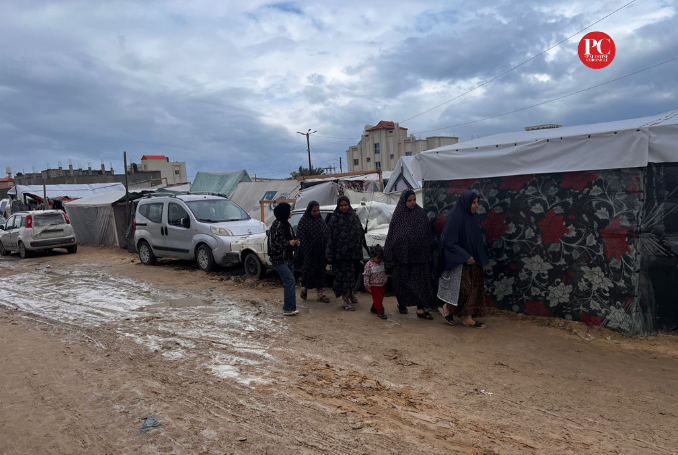
“The children here lack access to healthcare and are not safe in this unhygienic environment.”
Displaced Palestinians seeking refuge in the southern Gaza town of Rafah find themselves living amid piles of uncollected trash as garbage trucks are rendered unusable in Israeli attacks, and fuel shortages hinder regular waste collection, according to a report.
“We can’t sit in the tent due to the smell of garbage and flies. Children can’t sleep because of the flies. A solution needs to be found to this garbage crisis,” Ummu Mahmud al-Hindi, who fled from north Gaza, told the Anadolu news agency.
Hindi said that among family members, in addition to children, there are also the sick, disabled, and elderly.
The garbage piling up among the tents and shelters creates an environment conducive to the spread of infectious diseases, said the report.
Ahmed Dawud, who was displaced from Gaza City to Khan Yunis, and then Rafah noted that his wife and children were “greatly affected” by the situation.
“The immune levels of my three children have decreased. My wife also suffers because part of her liver and spleen have been removed,” he told Anadolu.
Pointing to a pile of dirt, Dawud said: “This is just a small pile you see. If the municipality hadn’t come yesterday to collect the garbage, it would have reached here.”
Flowing Sewage
Another Palestinian, Abdulkadir Ahmed, displaced from the Cibaliya Refugee Camp about five months ago, highlighted the sewage flowing between the tents.
“We are enduring very difficult conditions here during the winter,” Ahmed said.
“There are many children in the tents, and these children are at risk of many diseases, including hepatitis, intestinal and respiratory diseases. The children here lack access to healthcare and are not safe in this unhygienic environment.”
He stressed that the tents do not protect from illness and cold nor provide a humane living space.
High Number of Displaced
Husni Muhenna, the Gaza Municipalities Union Coordinator, told Anadolu that municipalities in the central and southern parts of Gaza are unable to provide basic services due to the increasing number of displaced people.
Muhenna said services such as garbage collection, sewage disposal, and water pumping are greatly affected by population growth and fuel shortages.
Muhenna noted that municipal teams are struggling to cope with increasing garbage piles in Rafah and Deir al-Balah.
Roughly 1.5 million Palestinians are sheltering in Rafah, many of whom were displaced from other areas destroyed by Israel in its ongoing military assault on the besieged enclave.
As Israel continues to vow to press ahead with a ground invasion of Rafah, the secretary general of Doctors Without Borders (MSF), Christopher Lockyear, warned last month that “Clearly any ground invasion into Rafah would be an absolute catastrophe, it doesn’t bear thinking about, it would be disaster upon disaster.”
The Palestine Chronicle spoke to the al-Ashqar family who are sheltering in Rafah, in a camp where there is little food and even fewer supplies.
More than 33,100 Killed
Currently on trial before the International Court of Justice for genocide against Palestinians, Israel has been waging a devastating war on Gaza since October 7.
According to Gaza’s Ministry of Health, 33,175 Palestinians have been killed, and 75,886 wounded in Israel’s ongoing genocide in the enclave.
Moreover, at least 7,000 people are unaccounted for, presumed dead under the rubble of their homes throughout the Strip.
Palestinian and international organizations say that the majority of those killed and wounded are women and children.
The Israeli aggression has also resulted in the forceful displacement of nearly two million people from all over the Gaza Strip, with the vast majority of the displaced forced into the densely crowded southern city of Rafah near the border with Egypt – in what has become Palestine’s largest mass exodus since the 1948 Nakba.
Israel says that 1,200 soldiers and civilians were killed during the Al-Aqsa Flood Operation on October 7. Israeli media published reports suggesting that many Israelis were killed on that day by ‘friendly fire’.
(PC, Anadolu)








